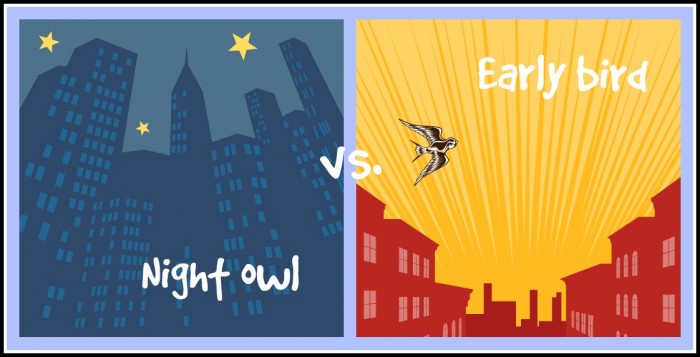One of the desirable traits constantly mentioned in the Adarsh Balak (ideal boy) posters is the habit of getting up early in the morning. It was most famously articulated by Benjamin Franklin who said, “early to bed and early to rise makes a man healthy, wealthy, and wise” and the saying has now entered popular lexicon. Indeed this advice is oft repeated and has seemingly worked in a context where schools and offices begin early. However, the understanding around being an early bird (morning people) and the night owls (the late risers) is becoming more nuanced.
Research now finds that the difference may lie in one’s genes. Genetics company 23andMe sequenced genomes of 90,000 people and identified 15 versions of genes that were linked to reports of being an early or a late riser. Another report by live science explains that interplay of the myriad of genes controls one’s circadian rhythm (the 24- hour cycle of waxing and waning biological processes) and right from birth our personal biological clocks are already wound.
In most cases, people are neither a pure lark nor owl and can get up an hour or two earlier and also sleep an hour or two earlier without difficulty. However, the live science report quotes a professor of psychology at Penn University, Frederick Brown who notes that “People span the range of those who are very early risers to very late setters, and this is genetically determined… If you’re a morning-type person, you can’t become an evening type, and vice versa.” Scientists in Russia are in fact proposing that there are actually four chronotypes and in addition to the late and early risers, there are people who feel energetic in both mornings and evening, and those who feel lethargic all day.
It has now emerged from a recent study by the University of Barcelona that there are also important personality differences between early and late risers. Morning people tend to have lower levels of fatigue, lower rates of anxiety and depression and tend to be more persistent. Moreover, they are more cooperative, agreeable and conscientious and are less likely to procrastinate. On the other hand, evening people are more impulsive, creative, temperamental and novelty seeking. While night owls have a higher IQ, those who wake up early are in a better position for success.
Professor Jim Horne, of Loughborough University, explains: “Evening types tend to be the more extrovert creative types, the poets, artists and inventors, while the morning types are the deducers, as often seen with civil servants and accountants…We have looked at morning and evening types and we found that personalities tended to be different. Evening types were more social, more people-oriented. They will probably be good at cryptic crosswords, while morning types go for the more logical ones.”
Such research can help schools and businesses understand work times better. For a long time, getting up late has been associated with laziness and lack of a work ethic. In a culture where work begins early and late night activities are viewed with suspicion, late risers have struggled. However, this is now changing. With the Internet, faster communication technology, global workspaces and workers often spread across different time zones, fixed work timings are becoming a thing of the past. For workers who are a part of global economy and information, there are no fixed timings. Universities with 24/7 libraries and laboratories already offer this flexibility. Not just at workplaces but even utilities like 24/7 grocery stores, late night or all night food deliveries, and night cafes and restaurants are offering the night owls flexibility to make most of their productive hours.
In any case, now there is enough research and evidence to support that both night owls and morning larks have an equal chance at success and happiness, which is dependent on many other factors as well. Some famous night owls include Barack Obama, Winston Churchill, Bob Dylan, Franz Kafka, JRR Tolkien etc. On the other hand, some famous larks include Napoleon, Ernest Hemingway, George W Bush, and interestingly a whole lot of CEOs. And if you are wondering about the company you fall in you can take this quiz to find out.
Disclaimer: The opinions expressed in this article are the personal opinions of the author. The facts and opinions appearing in the article do not reflect the views of NEWSD and NEWSD does not assume any responsibility or liability for the same.


















